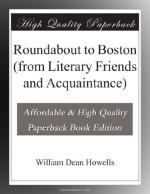For the rest, I fancy it was very well for us to be represented at Vienna in those days by an ideal democrat who was also a real swell, and who was not likely to discredit us socially when we so much needed to be well thought of in every way.
At a court where the family of Count Schmerling, the Prime Minister, could not be received for want of the requisite descents, it was well to have a minister who would not commit the mistake of inviting the First Society to meet the Second Society, as a former Envoy Extraordinary had done, with the effect of finding himself left entirely to the Second Society during the rest of his stay in Vienna.
II.
One of my consular colleagues under Motley was another historian, of no such popularity, indeed, nor even of such success, but perhaps not of inferior powers. This was Richard Hildreth, at Trieste, the author of one of the sincerest if not the truest histories of the United States, according to the testimony both of his liking and his misliking critics. I have never read his history, and I speak of it only at second hand; but I had read, before I met him, his novel of ’Archy Moore, or The White Slave’, which left an indelible impression of his imaginative verity upon me. The impression is still so deep that after the lapse of nearly forty years since I saw the book, I have no misgiving in speaking of it as a powerful piece of realism. It treated passionately, intensely, though with a superficial coldness, of wrongs now so remote from us in the abolition of slavery that it is useless to hope it will ever beg generally read hereafter, but it can safely be praised to any one who wishes to study that bygone condition, and the literature which grew out of it. I fancy




